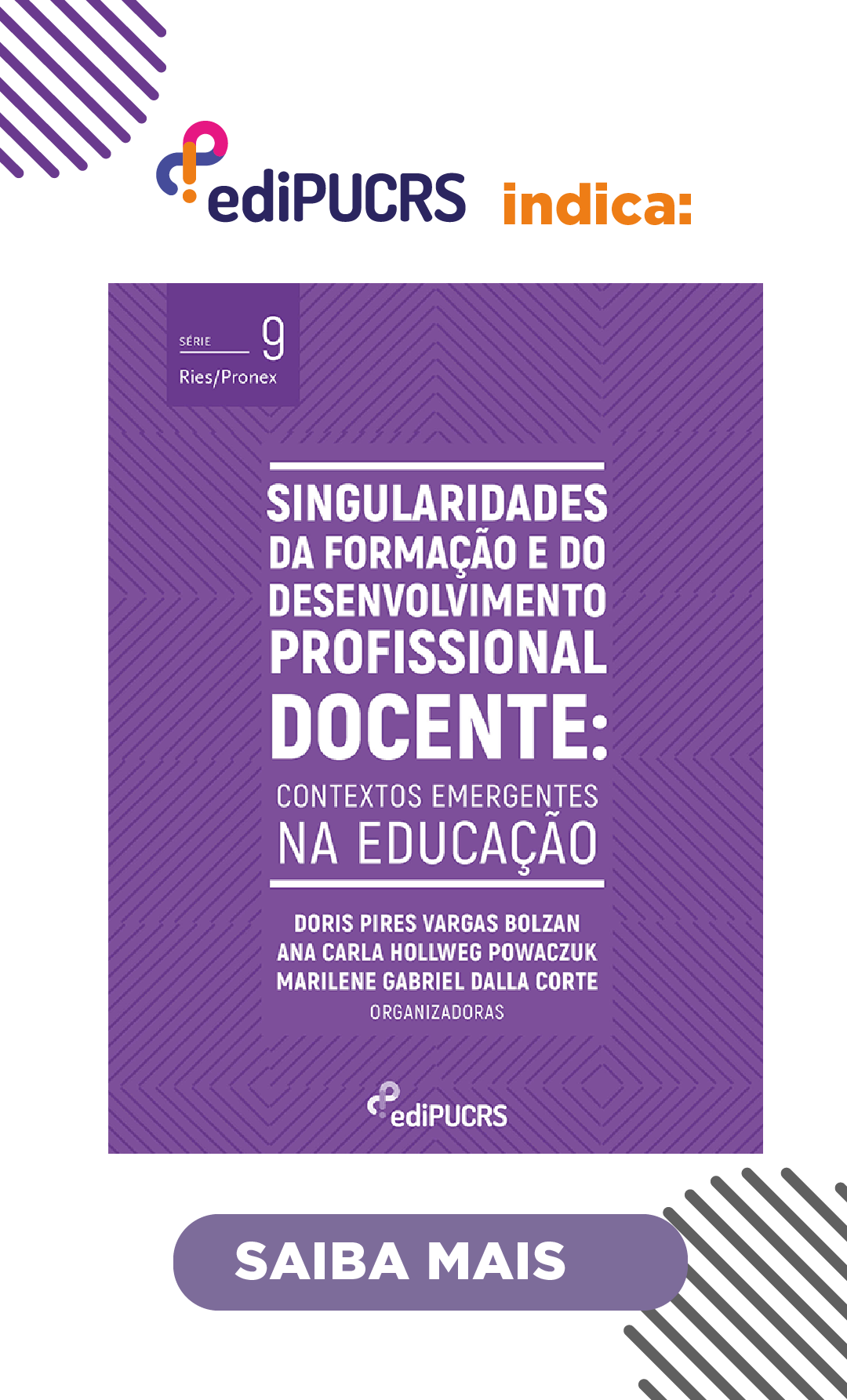Approaching content related to Afro-Brazilian and African History and Culture in teaching Sociology through gamification
DOI:
https://doi.org/10.15448/2179-8435.2024.1.45361Keywords:
Gamification, Digital games, Sociology, Afro-Brazilian History and CultureAbstract
This article presents a report on the experience of the research project “Implications of approaching content related to Afro-Brazilian and African history and culture in the teaching of Sociology through gamification”, a case study whose initial objective was to understand the social and pedagogical implications of approaching content related to Afro-Brazilian and African history and culture in teaching Sociology at secondary level through gamification. The initially designed methodology could not be implemented due to the setbacks encountered in carrying out the project, which included holding digital game production workshops and focus groups in schools, in order to identify the limits, obstacles and possibilities brought about by gamification. in the engagement of students in the study of this topic. As an alternative to the difficulties encountered, there was a redefinition of the processes and results initially foreseen with the production of a website with gamified resources to support the process of approaching content related to Afro-Brazilian History and Culture in Sociology classes and indication of related websites.
Downloads
References
ALVES, L.; COUTINHO, I. J. (org.). Jogos digitais e aprendizagem: fundamentos para uma prática baseada em evidências. Campinas: Papirus, 2016.
ALVES, L. R. G.; MINHO, M. R. S.; DINIZ, M. V. C. Gamificação: diálogos com a Educação. In: FADEL, L. M. et al. (org.). Gamificação na educação. São Paulo: Pimenta Cultural, 2014. p. 74-97.
ANDRADE, F. J. de; ABREU, E. E. Jogos educativos digitais construídos com Power Point. In: SILVA, E. K. S.; SILVA, E. L.; CORRÊA, A. M. S. (org.). Objetos virtuais de aprendizagem na formação e prática docente. João Pessoa: Ideia, 2020. p. 179-208.
BARROS, Z. dos S. Implicações da formação à distância para o ensino de História e Cultura Afro-brasileiras. 2013. Tese (Doutorado em Estudos Étnicos e Africanos) – Faculdade de Filosofia e Ciências Humanas, Universidade Federal da Bahia, Salvador, 2013.
BRASIL. Lei n. 10.639, de 9 de janeiro de 2003. Altera a Lei n. 9.394, de 20 de dezembro de 1996, que estabelece as diretrizes e bases da educação nacional, para incluir no currículo oficial da Rede de Ensino a obrigatoriedade da temática “História e Cultura Afro-Brasileira”, e dá outras providências. Brasília, DF: Presidência da República, 2003. Disponível em: https://www.planalto.gov.br/ccivil_03/leis/2003/l10.639.htm#:~:text=L10639&-text=LEI%20No%2010.639%2C%20DE%209%20DE%20-JANEIRO%20DE%202003.&text=Altera%20a%20Lei%20-no,%22%2C%20e%20d%C3%A1%20outras%20provid%- C3%AAncias. Acesso em: 26 out. 2024.
BRIDI, Maria Aparecida; ARAÚJO, Silvia Maria de; MOTIM, Benilde Lenzi. Ensinar e aprender Sociologia no ensino médio. São Paulo: Contexto, 2010.
DICKMANN, I. O triângulo da gameducação: os três pilares para gamificar uma aula. In: DICKMANN, I. (org.). Start: como a gamificação e os jogos de aprendizagem estão transformando a práxis educativa atual com suas dinâmicas inovadoras e criativas. Chapecó: Livrologia, 2021. p. 13-34.
FERNANDES, C. W. R. Games, gamificação e o cenário educacional brasileiro. In: DICKMANN, I. (org.). Start: como a gamificação e os jogos de aprendizagem estão transformando a práxis educativa atual com suas dinâmicas inovadoras e criativas. Chapecó: Livrologia, 2021. p. 89-110.
GAMIFICAÇÃO AFRO-BRASILEIRAS. Disponível em: https://gamificacaoafrobrasileiras.blogspot.com. Acesso em: 26 out. 2024.
GIACOMONI, M. P.; PEREIRA, N. M. Flertando com o caos: os jogos no ensino de História. In: GIACOMONI, M. P.; PEREIRA, N. M. (org.). Jogos e ensino de história. Porto Alegre: Editora da UFRGS, 2018. p. 9-18.
HUIZINGA, J. Homo Ludens. 4. ed. São Paulo: Perspectiva, 2000.
MEIRA, L.; BLIKSTEIN, P. (org.). Ludicidade, jogos e gamificação na aprendizagem. Porto Alegre: Penso, 2020.
OLIVEIRA, M. G. Metodologias ativas no ensino de História. In: SILVA, A. R. L.; BIEGING, P.; BUSARELLO, R. I. (org.). Metodologia ativa na educação. São Paulo: Pimenta Cultural, 2017. p. 68-85.
PETRY, A. S. Jogos digitais e aprendizagem: algumas evidências de pesquisa. In: ALVES, L.; COUTINHO, I. de J. (org.). Jogos digitais e aprendizagem: fundamentos para uma prática baseada em evidências. Campinas: Papirus, 2016. p. 43-60.
PETRY, L. C. O conceito ontológico de jogo. In: ALVES, L.; COUTINHO, I. de J. (org.). Jogos digitais e aprendizagem: fundamentos para uma prática baseada em evidências. Campinas: Papirus, 2016. p. 17-42.
PRENSKY, M. Aprendizagem baseada em jogos digitais. São Paulo: Ed. SENAC, 2012.
REZENDE, B. A.; MESQUITA, V. S. O uso de gamificação no ensino: uma revisão sistemática da literatura. In: SBGAMES, 16., 2017, Curitiba. Proceedings [...]. Curitiba: [s. n.], 2017. p. 1004-1007. Disponível em: https://www.sbgames.org/sbgames2017/papers/CulturaShort/175052. pdf. Acesso em: 25 out. 2024.
SANTOS, S. A. Educação: um pensamento negro contemporâneo. São Paulo: Paco Editorial, 2014.
SILVA, M. Sala de aula interativa: educação, comunicação, mídia clássica. 7. ed. São Paulo: Edições Loyola, 2014.
TOBIAS, L. I. P. Power Point como ferramenta de gamificação em sala de aula. In: DICKMANN, I. (org.). Start: como a gamificação e os jogos de aprendizagem estão transformando a práxis educativa atual com suas dinâmicas inovadoras e criativas. Chapecó: Livrologia, 2021. p. 207-215.
TOYAMA, K.; ROSA, V. F. O uso de jogos didáticos no ensino de Ciências destinados às crianças com TDAH: uma análise em produções científicas. Educação por Escrito, Porto Alegre, v. 14, n. 1, p. e43285, 2023. Disponível em: https://doi.org/10.15448/2179-8435. 2023.1.43285. Acesso em: 25 out. 2024. DOI: https://doi.org/10.15448/2179-8435.2023.1.43285
Downloads
Published
How to Cite
Issue
Section
License
Copyright (c) 2024 Educação Por Escrito

This work is licensed under a Creative Commons Attribution 4.0 International License.
Copyright
The submission of originals to Educação Por Escrito implies the transfer by the authors of the right for publication. Authors retain copyright and grant the journal right of first publication. If the authors wish to include the same data into another publication, they must cite Educação Por Escrito as the site of original publication.
Creative Commons License
Except where otherwise specified, material published in this journal is licensed under a Creative Commons Attribution 4.0 International license, which allows unrestricted use, distribution and reproduction in any medium, provided the original publication is correctly cited.





